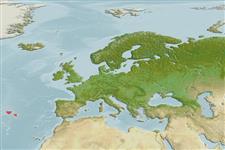>
Eupercaria/misc (Various families in series Eupercaria) >
Labridae (Wrasses)
Etymology: Symphodus: Greek, syn, symphysis = grown together + Greek, odous = teeth (Ref. 45335); caeruleus: Named for th edistinctive blue coloration of males..
Environment: milieu / climate zone / depth range / distribution range
Ecologia
marinhas demersal; não migratória; intervalo de profundidade 1 - 30 m (Ref. 35939), usually 5 - 15 m (Ref. 35939). Tropical; 39°N - 36°N, 32°W - 24°W
Northeast Atlantic: Madeira, Canary Islands and the Azores Islands.
Tamanho / Peso / Idade
Maturity: Lm ? range ? - ? cm
Max length : 21.5 cm SL macho/indeterminado; (Ref. 35939); 17.5 cm SL (female)
Descrição breve
Chaves de identificação | Morfologia | Morfometria
Espinhos dorsais (total) : 17 - 18; Raios dorsais moles (total) : 8 - 9; Espinhos anais: 5 - 6; Raios anais moles: 7 - 9. Modal count of rays on dorsal fin 26 and anal fin 14; scales on lateral line 33-34; dark blue coloration of the males during spawning season (Ref. 35939).
Oviparous, distinct pairing during breeding (Ref. 205). Males build dish shaped nests and guard the eggs (Ref. 205).
Life cycle and mating behavior
Maturities | Reprodução | Spawnings | Egg(s) | Fecundities | Larvas
Oviparous, distinct pairing during breeding (Ref. 205). Males build dish shaped nests and guard the eggs (Ref. 205).
Azevedo, M., 1999. Centrolabrus caeruleus sp.nov., a long unrecognized species of marine fish (Teleostei, Labridae) from the Azores. Bocagiana 196:1-11. (Ref. 35939)
Categoria na Lista Vermelha da IUCN (Ref. 130435)
Ameaça para o homem
Harmless
Utilização humana
Ferramentas
Relatórios especiais
Descarregue XML
Fontes da internet
Estimates based on models
Preferred temperature (Ref.
123201): 18.7 - 19.1, mean 18.8 °C (based on 9 cells).
Phylogenetic diversity index (Ref.
82804): PD
50 = 0.5005 [Uniqueness, from 0.5 = low to 2.0 = high].
Bayesian length-weight: a=0.01000 (0.00473 - 0.02115), b=3.07 (2.90 - 3.24), in cm total length, based on LWR estimates for this Genus-body shape (Ref.
93245).
Nível Trófico (Ref.
69278): 3.5 ±0.5 se; based on size and trophs of closest relatives
Resiliência (Ref.
120179): Médio, tempo mínimo de duplicação da população 1,4 - 4,4 anos (Preliminary K or Fecundity.).
Fishing Vulnerability (Ref.
59153): Low vulnerability (16 of 100).
